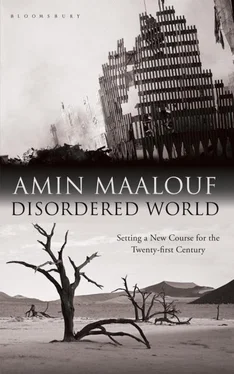In truth, when I look at the various regions of the world, Europe worries me least, because it seems that more so than elsewhere it has taken stock of the scale of the challenges facing humanity; because it has the necessary people and institutions to debate them effectively and work out solutions; and because the EU provides a project to commit to and strong ethical concerns, even if sometimes it seems to take them too readily for granted.
Regrettably there is nothing comparable elsewhere. For decades the Arab-Muslim world had been sinking deeper and deeper into a historic pit from which it seemed incapable of extricating itself. It felt rage against the whole world — the West, the Russians, the Chinese, the Hindus, the Jews, and so on — and above all against itself. The countries of Sub-Saharan Africa, with rare exceptions, are plagued by civil wars, epidemics, sordid trafficking, widespread corruption, disintegrating institutions, a fraying social fabric, mass unemployment and despair. Russia is struggling to recover from seventy years of Communism and the chaotic way it ended; its leaders dream of regaining their former power, while its people remain disillusioned. The United States, meanwhile, having defeated its principal global adversary, finds itself engaged in a titanic enterprise which is wearing it down and leading it off course: trying to tame an untameable planet almost single-handed.
Even China, which has experienced a spectacular rise, has reason to be worried. For even if now, at the beginning of this century, its path seems clear — to relentlessly pursue economic development while carefully preserving its cohesion as a society and a nation — its future role as a political and military power is beset with serious uncertainties, as much for China itself as for its neighbours and the rest of the world. The Asian giant still possesses a more or less reliable compass, but it is getting close to a point where it will no longer be of use.
In one way or another, all the people on earth are in the same storm. Rich or poor, arrogant or downtrodden, occupiers or occupied, they are — we are — all aboard the same fragile raft and we are all going down together. Yet we go on insulting and quarrelling with each other, without heeding the rising tide.
We might even cheer if a devastating wave heading towards us engulfed our enemies first.
There is another reason why I chose the European Union as my first example: it provides a good demonstration of a phenomenon known both to historians and to each of us in our own lives — namely that failure may turn out to be providential and success may turn to disaster. The end of the Cold War seems to me to be a deceptive event of that sort.
The fact that Europe’s triumph has caused it to lose its bearings is not the only paradox of our times. One could argue in the same way that the West’s strategic victory, which should have consolidated its supremacy, has accelerated its decline; that the triumph of capitalism has precipitated the worst crisis in its history; that the end of the ‘balance of terror’ has created a world obsessed with ‘terror’; and also that the defeat of a notoriously repressive and anti-democratic Soviet system has greatly diminished the quality of political debate all over the planet.
I want to focus on the last of these points first, to underline the fact that with the end of bipolar confrontation we went from a world in which divisions were mainly ideological and the debate incessant to a world in which the divisions are mainly on identity lines and leave little room for debate. Everyone asserts his own allegiances in front of others, utters his curses, mobilises his own people, demonises his enemies — for what else is there to say? Adversaries today scarcely speak the same language.
That is not to say that I miss the intellectual climate of the Cold War (which was not to begin with cold everywhere — it splintered into numerous side conflicts which cost millions of lives, from Korea to Afghanistan, Hungary to Indonesia, and Vietnam to Chile and Argentina). It seems to me nonetheless legitimate to deplore the fact that the world emerged from the Cold War at the lowest level, by which I mean heading towards less universalism, rationality and secularism; towards a reinforcement of inherited allegiances rather than acquired knowledge; and thus towards less open debate.
During the ideological confrontation between Marxism’s supporters and its opponents, the whole planet resembled a huge amphitheatre. In newspapers, universities, offices, factories, cafés and homes, most human societies were buzzing with endless discussions of the pros and cons of this or that economic system, philosophy or way of organising society. Since the defeat of Communism, when it ceased to offer humanity a credible alternative, these exchanges have lacked a subject. That may be why so many people have turned their backs on their tattered utopias and sought shelter under the reassuring roof of their community. It may also be the case that the political and moral defeat of resolutely atheist Marxism has renewed enthusiasm for the beliefs and forms of solidarity which Marxism sought to root out.
The fact remains that, since the fall of the Berlin Wall, we find ourselves in a world in which allegiances — especially religious ones — are stronger; in which coexistence between different human communities is as a result a little more difficult each day; and in which democracy is constantly at the mercy of identity politics and one-upmanship.
This slide from ideology to identity has had devastating effects all across the globe, but nowhere more so than in the Arab-Muslim world, where religious radicalism, long the preoccupation of a persecuted minority, has achieved massive intellectual predominance within most societies as well as in the diaspora. In the course of its rise, this tendency began to adopt a violently anti-Western stance.
This development, set in motion by the advent of Ayatollah Khomeini in 1979, has become more pronounced since the end of the Cold War. As long as the confrontation between the two blocs lasted, most Islamist movements were markedly more hostile to communism than capitalism. They may never have had any sympathy with the West, its politics, way of life or values, but the Marxists’ militant atheism provoked their hostility. At the same time, the Islamists’ local enemies, especially the Arab nationalists and left-wing parties, followed the opposite path, becoming allies or clients of the Soviet Union. This alignment was to have disastrous consequences for them, but it was in a way dictated by their history.
For generations, the modernist elites of the Arab-Muslim world sought in vain to square the circle, that is to say, to Europeanise without giving in to the hegemony of the European powers which dominated countries from Java to Morocco and which controlled their resources. Their independence struggles had, after all, been fought against the British, French and Dutch, and each time their countries tried to take control of key sectors of their economies, it was Western oil companies — or in the case of Egypt, the Franco-British Suez Canal Company — that they came into conflict with. The emergence in Eastern Europe of a powerful bloc which advocated rapid industrialisation, touted the slogan ‘friendship between peoples’, and firmly opposed the colonial powers struck many of them as a way out of this impasse.
In the aftermath of independence struggles, looking to the Communist states seemed reasonable and promising. In hindsight, it turned out to be disastrous. The elites of the Arab-Muslim world didn’t achieve development, national liberation, democracy or social modernity; all they got was a local, nationalistic brand of Stalinism entirely lacking the attributes that had given the Soviet regime its international influence: its internationalist rhetoric, its massive contribution to the defeat of Nazism from 1941 to 1945, and its ability to build a military power of the first order. Instead, all that the so-called ‘progressive’ Arab regimes were able to imitate were the Soviet model’s worst defects: its tendency to xenophobia, police brutality, notoriously ineffective economic planning, as well as the confiscation of power by the party, a clan or the leader. Saddam Hussein’s secular regime was a telling example of this.
Читать дальше












